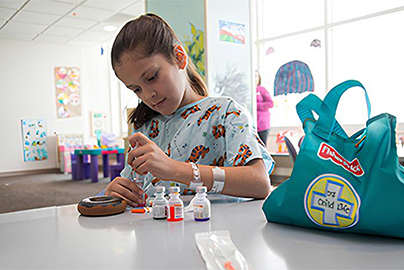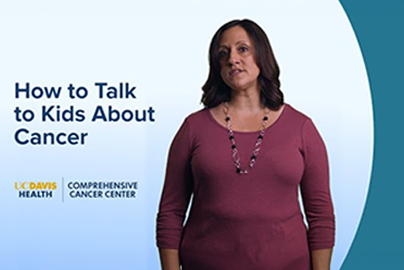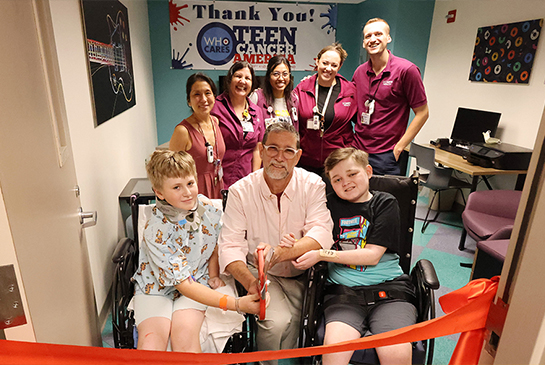Pediatric Cancer Care
Pediatric Support Resources

Child Life Program
The Child Life Program, made possible by UC Davis Children’s Hospital, helps provide a positive environment for children, one in which they can grow and develop while receiving medical care. Child life specialists, music therapists and art therapists are trained to offer developmental, educational and therapeutic interventions for children and their families under stress.
UC Davis’ Child Life Specialists
Child Life Specialists at UC Davis provide compassionate, developmentally appropriate support to help children and families navigate the challenges of medical care.
- Provide information, support and education to families
- Explain medical and surgical procedures to children using play, puppets and medical equipment
- Accompany children to medical procedures and/or surgeries to provide explanation, reassurance and emotional support
- Introduce coping strategies to help reduce anxiety and enhance cooperation with the health care team
- Help siblings understand the infusion center environment, coping and visitation
- Arrange special events and activities for children and families to help normalize the infusion room environment
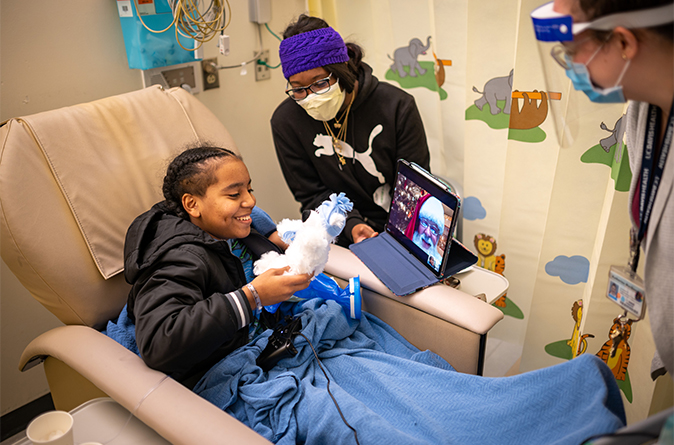
-
UC Davis Child Life Program
Explore morearrow_forwardChild life specialists support children and their families during cancer treatment. They use play and education to reduce anxiety and promote coping. They provide patient-centered care, addressing each child’s psychosocial and developmental needs. Play materials are available at the bedside and in Keaton’s Korner.
-
How to Talk to Kids About Cancer
Art Therapy
Art Therapy promotes healing through creative expression. Our art therapist helps children cope with symptoms, stress and traumatic experiences by engaging them in art making. This form of therapy allows children to express their feelings and experiences without relying on words, fostering insight and discovery in a safe and secure environment.
-

Re-Entry Program
Pediatric School Re-entry Program: Supporting Transitions. Our Child Life staff at UC Davis Comprehensive Cancer Center provides personalized presentations to educate peers and school staff about a child’s diagnosis, treatment and potential changes in abilities. This program fosters understanding, reduces bullying and supports a smooth transition back to school. For more information, please contact Marisa Martinez, CCLS or your child's provider.
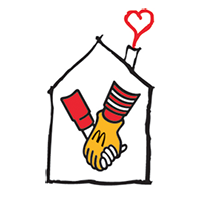
Ronald McDonald House
Ronald McDonald House is a “home away from home” for families who must travel at least 30 miles to seek medical treatment for their child. The Sacramento Ronald McDonald House is a 38-room facility. There are 36 single bedrooms and 2 two-bedroom apartments. Family members have their own bedrooms and bathrooms and share common kitchens, living and laundry facilities. Additionally, there are special rooms set up with toys, computers and video game consoles for the children. The house offers parents and family members of seriously ill and injured children a refuge from the hospital. Families are asked for a $20 donation per night, although no family is ever turned away due to the inability to pay.
Learn more about lodging options
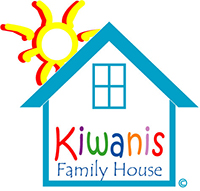
Kiwanis Family House
The Kiwanis Family House offers inexpensive family accommodations for patients and families who travel long distances to receive medical treatment. Residency is offered through a referral system.
Survivorship Clinic
The survivorship clinic specifically addresses the long-term effects of cancer treatment on pediatric cancer patients. After completing treatment for cancer, children receive regular check-ups and follow-up care to help evaluate and manage any effects of their cancer treatment.
Long-term effects from cancer surgery, chemotherapy and radiation therapy may include physical, emotional or intellectual problems that develop or evolve over time. Having a clinic dedicated to these issues improves monitoring and early identification, as well as facilitates access to further care when needed.
National Cancer Institute
A component of the National Institutes of Health and the US Department of Health and Human Services founded in 1937, NCI has built a national network of regional and community cancer centers, physicians who are cancer specialists, cooperative groups of clinical researchers, and volunteer and community outreach groups.
National Cancer Institute site
American Cancer Society
A grassroots organization with three million volunteers at its core, the 100-year-old nonprofit is the nation’s largest non-governmental funder of cancer research. For more resources, please visit the Patient and Family Learning Center.


